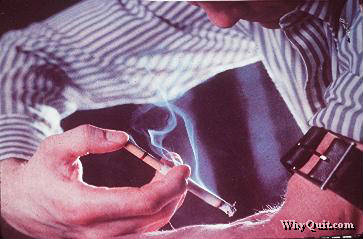You Smoke Because You're A Smoke-a-holic!
Some smokers say they smoke because they are nervous. Others say they smoke to celebrate. Some think they smoke for energy. Many smoke to look sexy. Yet others smoke to stay awake or to sleep. Some think they smoke to think. One truly unique smoker once told me she smoked to breathe better. Another once said she returned to smoking when experiencing chest pains. She figured the fear of a heart attack is enough to make anyone smoke.
None of these reasons satisfactorily explains why people continue smoking. However, the answer is, in fact, quite simple. Smokers smoke cigarettes because they are smokers. More precisely, smokers smoke cigarettes because they are smoke-a-holics.
A smoke-a-holic, like any other drug addict, has become hooked on a chemical substance. In the cigarette smoker's case, nicotine is the culprit. He is at the point where the failure to maintain a minimum level of nicotine in his blood stream leads to the nicotine abstinence syndrome, otherwise known as drug withdrawal. Anything that makes him lose nicotine makes him smoke.
This concept explains why so many smokers feel they smoke under stress. Stress has a physiological effect on the body which makes the urine acidic. Whenever the urine becomes acidic, the body excretes nicotine at an accelerated rate. Thus, when a smoker encounters a stressful situation he loses nicotine and goes into drug withdrawal.
Most smokers feel that when they are nervous or upset that cigarettes help calm them down. The calming effect, however, is not relief from the emotional strain of the situation, but actually the effect of replenishing the nicotine supply and ending the withdrawal.
It is easy to understand why smokers without this basic knowledge of stress and its nicotine effect are afraid to give up smoking. They feel that they will be giving up a very effective stress management technique. But once they give up smoking for a short period of time, they will become calmer, even under stress, than when they were smokers.
The explanation of how physiological changes in the body make smokers smoke is difficult for some smokers to believe. But nearly all smokers can easily relate to other situations which also alter the excretion rate of nicotine.
Ask a smoker what happens to their smoking consumption after drinking alcohol, and you can be sure they will answer that it goes up. If asked how much their consumption rises, they will normally reply that it doubles or even triples when drinking.
They usually are convinced that this happens because everyone around them is smoking. But if they think back to a time when they were the only smoker in the room, they will realize that drinking still caused them to smoke more.
Alcohol consumption results in the same physiological effect as stress - acidification of the urine. The nicotine level drops dramatically, and the smoker must light one cigarette after another or suffer drug withdrawal.
It is important for smokers considering quitting to understand these concepts because once they truly understand why they smoke they will be able to more fully appreciate how much more simple their life will become as an ex-smoker.
Once the smoker stops, nicotine will begin to leave his or her body and within two weeks all the nicotine will be gone. Once the nicotine is totally out of the body, all withdrawal will cease. No longer will they experience drug withdrawal states whenever encountering stress, drinking, or just going too long without smoking. In short, they will soon realize that all the benefits they thought they derived from smoking were false effects. They did not need to smoke to deal with stress, or to drink, socialize, or work. Everything they did as a smoker they can do as a non-smoker, and in most cases they will now do these activities more efficiently and feel better during them.
They will become a more independent people. It is a good feeling and a major accomplishment to break free from this addiction. But no matter how long they are off smoking and how confident they feel, the ex-smoker must always remember that he or she is a smoke-a-holic.
Being a smoke-a-holic means that as long as they don't take a single drag off a cigarette, cigar or pipe, or chew tobacco, or inject it into their bloodstream with a syringe, they will never again become hooked on nicotine. If, on the other hand, they do make the tragic mistake of experimenting with any nicotine product, they will reinforce their addiction. This will result either in returning to their old level of consumption or experiencing a full fledged withdrawal process. Neither situation is fun to go through.
So, once off of smoking, the ex-smoker must always remember just who and what he is - a smoke-a-holic for the rest of his life. Remembering this, you can remain truly independent from nicotine by following one simple practice - Never Take Another Puff.
Share this article

Watch Joel's "you're a smokeaholic" video
Next Why People Continue to Smoke Article

